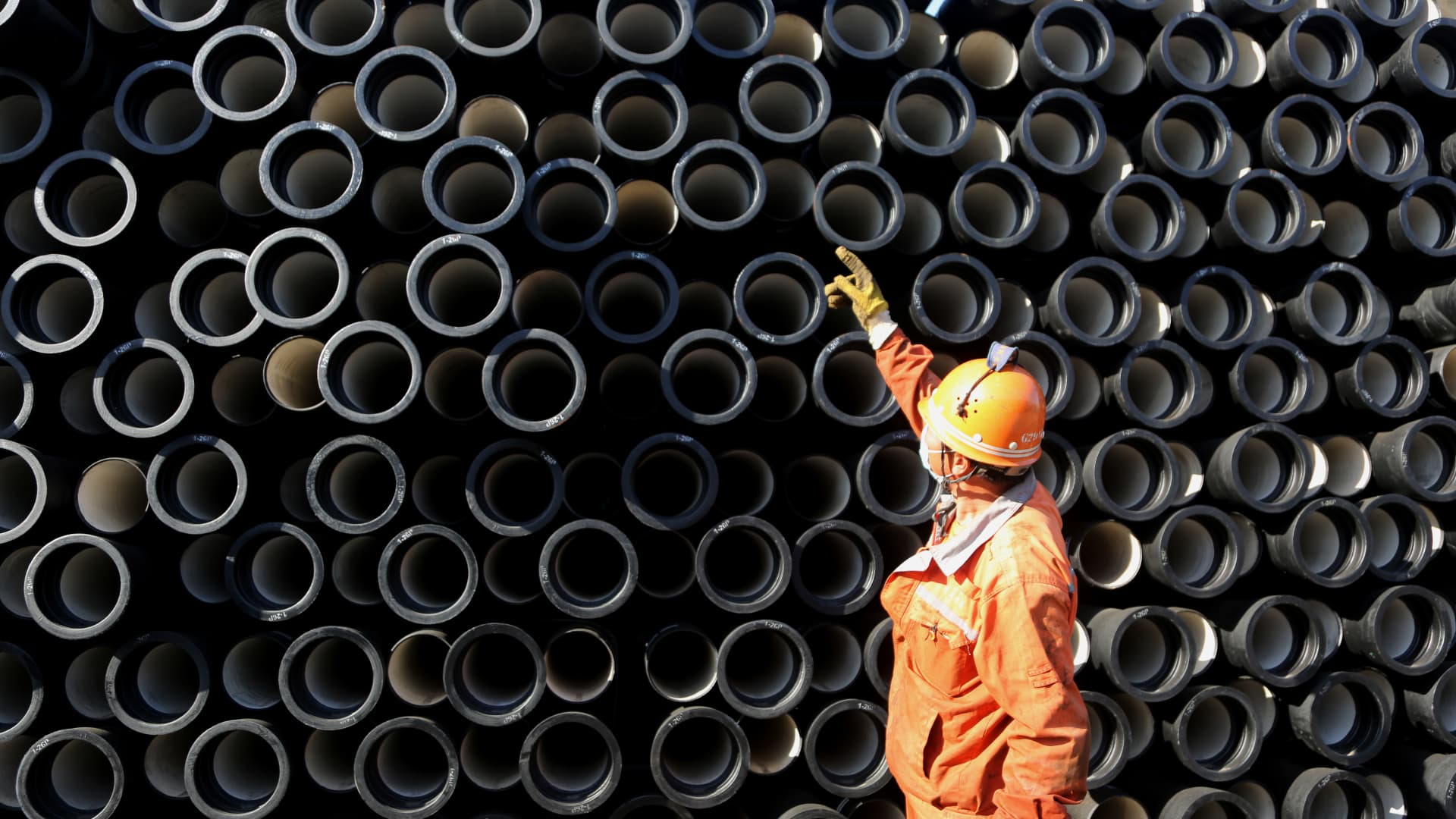[ad_1]
China’s biggest iron ore suppliers are optimistic about Beijing’s plans to roll out policies and stimuli to buttress the steel industry as the country faces economic headwinds and a struggling property industry.
Last week, Beijing introduced more of such stimulus policies including an additional 300 billion yuan ($44 billion) in quotas for infrastructure spending and investments by banks — on top of the 300 billion yuan already announced at the end of June.
While there are uncertainties surrounding the strength of the demand and production of steel in China, miners such as Australia’s Fortescue Metals Group say there are so far no signs demand has crumbled given low levels of iron ore inventory at Chinese ports.
“The market is cyclical, it is generally determined by the outlook for steel production in China … and we saw China last year, produced just over a billion tons of crude steel,” Fortescue chief executive Elizabeth Gaines told CNBC’s “Capital Connection” on Monday, following the release of the company’s annual results.
“We think China is probably on track to produce a similar amount of crude steel in this calendar year.”
Iron ore is a key ingredient for steel making, while steel is a raw material in many of China’s industries including the property sector.
A softening in the demand and output of steel can point to weaknesses in the Chinese economy and hurt earnings for iron ore miners reliant on the Chinese market, the biggest iron ore consumer in the world.
Profits at China’s industrial firms grew at a faster pace in October, the statistics bureau said on Nov. 27, 2021, providing a buffer for a faltering economy battered by soaring raw material prices. Pictured here is a worker counting cast steel pipes to be shipped aboard at Lianyungang Port in Lianyungang, Jiangsu province of China.
Wang Chun | Visual China Group | Getty Images
Last year, China produced 1.033 billion tonnes of crude steel, the first yearly decline since 2016. National steel production for the first seven months of this year is down 6.4% year-on-year.
In its forecast late last year, the China Metallurgical Industry Planning and Research Institute said it was expecting China’s 2022 output to slow to 1.017 billion tonnes — roughly a 1.5% decrease from the year before.
Despite the volatile demand for steel in China so far this year due to Covid lockdowns, Fortescue’s iron ore supplies reached a record 189 million tonnes in its 2021/2022 financial year, allowing the company to hit its second highest earnings on record of $17 billion for the same period, financial results showed.
About 88% of Fortescue’s iron ore sales are to China.
The company’s earnings, however, fell short of last year’s $22 billion due to falling iron ore prices, which had reacted to the softening economic conditions in China this year.
A Fortescue spokesperson says that while there are uncertainties about China’s steel production, the company believed Beijing’s “increased infrastructure investment, ongoing government policy support and further relaxation of Covid-zero policies” will continue to drive steel demand and therefore, production.
Other key iron ore suppliers were also positive about China’s industrial sector.
Anglo-Australian BHP Chief Executive Mike Henry said during the release of BHP’s annual results two weeks ago that he expected China to be “a source of stability for commodity demand in the year ahead, with policy support progressively taking hold.”
Expecting the recovery in the property sector to “take somewhat longer,” Henry said, however, there were tailwinds in China’s economy against the backdrop of weaker global conditions.
“So we believe, and continue to believe, that as China comes out of lockdowns, as there is a bit more stimulus provided, and all the policy settings that we see in China currently are aligned with that. Including recent meetings and what’s come out of those, that we will see a pick-up in the Chinese economy,” he said.
Brazilian miner Vale, another major iron ore supplier to China has also taken a positive view toward China.
Vale’s Executive Vice President Iron Ore Marcello Spinelli said during an earnings call in late July that he believed China is still committed to infrastructure investment even though there had been a delay. He also said Beijing is likely working toward resolving the property sector crisis.
“They are talking this week about property as a securities problem in China … so, there’s another level of commitment … and so we don’t see a hard land in the property, probably a soft land,” Spinelli said last month.
[ad_2]
Image and article originally from www.cnbc.com. Read the original article here.

